Tunisia’s Presidential Election: A Test for Democracy as Autocratic Trends Intensify

Tunisians are voting in a presidential election widely derided as lacking fairness and transparency, marking a possible end to the country’s democratic aspirations that emerged post-Arab Spring. Incumbent President Kais Saied has consolidated power, excluding opposition voices and implementing repressive measures. As candidates are disqualified and imprisoned, this election starkly contrasts with Tunisia’s historical electoral processes, raising significant concerns about the future of democracy in the nation.
On Sunday, Tunisians participate in a presidential election characterized by widespread critique and skepticism concerning its fairness. Many observers and opposition members argue that this vote represents a fading hope for democracy in Tunisia, which had once emerged as a beacon of political aspiration following the Arab Spring in 2011. Amidst regional turmoil and autocratic tendencies, Tunisia has progressively veered towards a more authoritarian regime, exacerbated by economic challenges that many citizens believe necessitate a strong leader. Sarah Yerkes, a senior fellow at Carnegie’s Middle East Program, assesses the situation, stating, “If you just look at the broad form of it, it appears to be a normal, potentially democratic election. But once you start to peel the layers off, it becomes very clear that this election is nowhere close to free or fair.” She concludes that the election marks the end of Tunisia’s democratic transition. The current president, Kais Saied, initially won significant support in 2019 as a rejection of established political entities following the Arab Spring, however, his administration soon began reversing democratic advancements. In July 2021, he embarked on a series of controversial actions, consolidating power by suspending parliament and ruling by decree. Further, voter turnout significantly declined during a 2022 constitutional referendum, indicating public disengagement. As Saied seeks re-election for a second term, the political landscape is heavily restricted. Out of 17 candidates who declared intentions to run, many have been disqualified or imprisoned, with one notable exception. The electoral commission, whose autonomy has been compromised, has faced criticism over its handling of candidates. Yerkes noted, “In the end, everyone who tried to run has been disqualified or thrown in jail, or both.” Political dissent has become increasingly dangerous; notable opposition figures have faced severe repercussions, including imprisonment on dubious charges. The arrests have drawn outrage, illustrated by public sentiment where citizens, like Chahed Bouzidi, view imprisoned candidate Ayachi Zammel as a symbol of resistance against Saied’s regime. Supporters of Saied, however, argue that he has initiated substantial reforms aimed at breaking away from corrupt precedents. Mahmoud Ben Mabrouk, part of Saied’s campaign team, emphasized that “Kais Saied didn’t put anyone in jail but there are people who went to complain in the police station and they simply said our ID were used to nominate a candidate without our consent.” This election is markedly different from preceding elections where independent observers deemed the processes fair. Presently, over 170 individuals face detention for political reasons, primarily targeting members of Ghannouchi’s Ennahda party, illustrating a starker reality under Saied’s rule. Moreover, recent legal amendments enable Saied to further entrench his authority, leading observers to criticize the legitimacy of the electoral framework. The situation has disillusioned many young voters and law students who see their former professor, Saied, in a disheartening light, as articulated by Maher Madhioub, an Ennahda politician, who remarked on the troubling dissonance in Saied’s actions as a constitutional law professor. In conclusion, this presidential election embodies the profound challenges faced by Tunisia—where political freedoms have been increasingly stifled, and the hopes of a democratic future dimmed under authoritarian rule, raising significant concerns for the nation’s civic and political landscape.
Tunisia’s journey toward democracy began with the Arab Spring in 2011, which inspired movements across the Middle East for a more democratic governance model. However, the political gains achieved in the decade that followed have been progressively undermined, leading to concerns about the current presidential election being a mere façade of democracy. Kais Saied, who assumed the presidency with a promise to eliminate corruption and revitalize the economy, has increasingly adopted autocratic methods. His actions, including sidelining democratic institutions and persecuting opposition, have led experts to fear that this election could signal the definitive end of Tunisia’s brief democratic experiment, which had previously stood in contrast to the chaos observed in other regional states.
Tunisia’s impending presidential election serves as a critical juncture for the nation, revealing deep-seated issues regarding political freedom, electoral integrity, and the authoritarian drift under President Kais Saied’s leadership. Experts warn that the election may have limited legitimacy, undermined by systemic disqualifications of opposition candidates and pervasive political repression. The future of democracy in Tunisia hangs delicately in the balance, amidst a backdrop of public disillusionment and heightened tensions within the political sphere.
Original Source: www.washingtonpost.com








